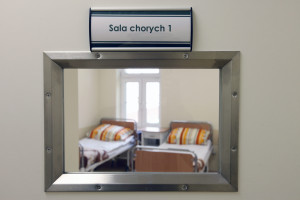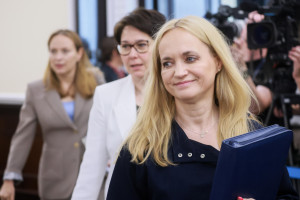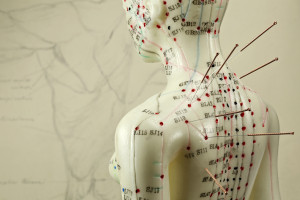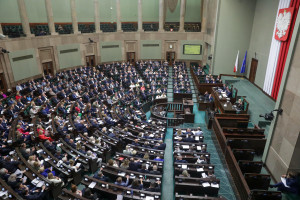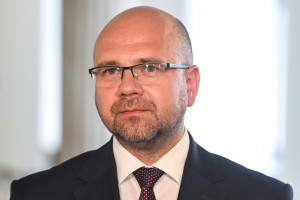Appeal from 38 psychotherapy associations rejected. "Your interests are not the most important thing."

- On Tuesday, the Sejm held a meeting of the extraordinary subcommittee to consider the government's draft law on the profession of psychologist and the professional self-government of psychologists (paper 1344)
- Surprisingly, the discussion was not about psychologists, but about psychotherapists.
- Earlier, the Ministry of Family received an appeal from 38 psychotherapeutic associations that wanted to remove psychotherapy as a psychological service from the Act on Psychologists.
- Arguments were raised about the depreciation of psychotherapists, chaos in medical facilities and an attempt to introduce a common register for the two professions.
- Psychologist and psychotherapist Joanna Gutral stated that including psychotherapeutic services in the Act on Psychologists could block access to the profession for psychotherapists without medical or psychological studies
- Marta Boczkowska, a clinical psychologist, accused the legitimization of quackery in psychotherapy. She pointed out that one of the 38 associations deals with bioenergetic analysis.
- Minister Agnieszka Dziemianowicz-Bąk addressed most of the issues. "It's not the interests of the state, psychotherapists, or psychologists that are most important in this regulation," she emphasized.
The discussion at the meeting of the parliamentary subcommittee on the pending act on the profession of psychologist was dominated by one amendment – that of MP and chairwoman of the Health Committee Marta Golbik , concerning the need to delete psychotherapy as a psychological service from Article 23, paragraph 2, point 5.
Earlier, Minister Agnieszka Dziemianowicz-Bąk received an appeal from 38 psychotherapist associations to support the amendment . The disputed article stipulates that practicing the profession of psychologist involves providing psychological services, which includes conducting psychotherapy, but only if the psychologist has acquired psychotherapy licenses under separate regulations.
The associations' appeal states that psychology and psychotherapy are separate services, and the current provision could devalue the profession of psychotherapist. According to the authors of the letter, this is an attempt to include psychotherapy in the Psychology Act, which they described as conflict-prone and devaluing for psychotherapists.
" A psychologist who is not a psychotherapist cannot record their psychotherapy sessions in their medical records, " they point out. Maintaining such records, the associations argue, will disorganize the work of healthcare providers and deepen the competence chaos in the private sector.
Concerns also concern the alleged attempt to introduce a common register for psychologists and psychotherapists, but also the subjection of psychotherapists to disciplinary proceedings carried out by another professional group, namely psychologists.
Anna Grzelka , who coordinates the work of the aforementioned 38 psychotherapist associations supporting the currently pending draft law on the psychotherapist profession, pointed out that legal definitions and professional regulations should be distinct, consistent, and non-discriminatory. "In the healthcare system, guaranteed health services provided by a psychotherapist and a psychologist are separate services," she reminded. She noted that when a more informed patient checks whether a psychologist is registered, they will think they "have the authority to provide psychotherapy."
"In my opinion, it would be an incomprehensible, even dangerous, precedent if a psychologist who also provides psychotherapy services—or only psychotherapy services—could choose whether to belong to the Chamber of Psychologists or the Chamber of Psychotherapists. In my opinion, the amendment to Article 23, removing psychotherapy from the Psychology Profession Act, is necessary," said MP Włodzisław Giziński , also a psychiatrist and psychotherapist.
What are psychotherapists afraid of? Joanna Gutral: It's about the private market.Joanna Gutral , a psychologist, psychotherapist, and researcher at the Dom Rozwoju Foundation, suggested that a psychologist who is also a psychotherapist would pay two separate contributions to the chambers. She added that 90% of psychotherapists are doctors and psychologists (the appeal from 38 psychotherapy associations stated that approximately 25% of psychotherapists have a basic education other than psychology).
She responded decisively to the appeal itself and its authors.
- It is hard for me to be surprised by the opposition of these associations, since 27 of them conduct training activities where a master's degree is sufficient - she noted.
She said that she absolutely understood the defense of the interest in openness to basic education in the case of psychotherapy training, "and the act on the profession of psychologist, or rather the inclusion of this benefit in this act, could somehow block it."
"There are doctors, lawyers, and psychotherapists among you. Would you be able to complete a medical specialization without completing medical school, or a legal counselor's apprenticeship without completing a law degree?" she wondered. "In this case, we're discussing whether psychotherapy should constitute a completely separate area of responsibility, entirely handed over to the private market under the Psychotherapy Profession Act, with only marginal oversight from the Minister of Health, which is truly unique," Gutral concluded.
We allow bioenergetic analyses, people dieMarta Boczkowska, who spoke as a representative of the Polish Society of Clinical Psychology and Psychotherapy EBP, said that it is difficult to imagine practicing psychotherapy without a psychological base, just as it is difficult to specialize in cardiology without medical studies.
"I operate primarily as a practitioner. I work in hematology and cardiology departments, but I primarily assist oncology patients. I read the appeal from psychotherapists. I see the Polish Association for Bioenergetic Analysis among them. This alarms me. I've seen the effects of bioenergetic analysis in hematology departments. These are not good results. These are not associations that represent science. These are private associations, ladies and gentlemen," she emphasized.
"Why don't we follow guidelines based on specific research in psychotherapy, but instead allow bioenergetic analyses that claim on websites that a person with a schizoid personality is one born in a modern hospital? Let's not allow pseudoscience into psychotherapy," she appealed.
There's only partial security in the psychologist's office. It's doubtful the patient would have guessed."I saw patients who died because they opted for radical forgiveness, various types of psychoanalysis of unknown origin, which led them to abandon medical treatment," she said.
Katarzyna Sarnicka, chairwoman of the Polish Psychologists' Union, expressed strong opposition to removing psychotherapy as a psychological service from the Act on Psychologists. "This provision does not limit or prohibit the provision of psychotherapy to individuals without a license to practice psychology. It also does not exempt psychologists with a license to practice psychology from meeting these criteria," she emphasized.
Wojciech Dragan , chairman of the Committee on Psychology of the Polish Academy of Sciences, assessed that the amendment would leave clients, patients, and recipients of psychologists' services who are psychotherapists in a vacuum. "They will not be protected in any way," he stated. The point is that protection would end the moment the psychologist begins providing psychotherapeutic services. "Of course, until separate regulations are introduced to regulate the potential profession of psychotherapist, which is not a foregone conclusion," he pointed out. It is worth clarifying that patients/clients of psychotherapists who are not psychologists are not and will not be legally protected until the act on this profession comes into force.
Dragan stated that psychotherapy is not "a separate field of knowledge or science." "Practicing psychotherapy is based on knowledge acquired during psychology studies," he explained.
Marcin Szafrański, representing the Polish Psychological Association, emphasized that the provision of psychological services, which is psychotherapy, is one thing, and practicing the profession of a psychotherapist is another.
"Do you psychologists believe that psychotherapy is the same as psychology? Let's not talk about the act on the psychotherapist profession today," Marta Golbik appealed, arguing that it is not a topic of discussion.
Agnieszka Dziemianowicz-Bąk dispels doubts. She received applause.The Minister of Family decided to respond more broadly to the appeal "from parts of the community – organizations, associations – connected in various ways to the field of psychotherapy" and to the proposals made during the subcommittee meeting. Below are the minister's key statements. The last statement was met with applause.
- There is currently no legal basis regulating the practice of psychotherapy. (…) When this bill is processed, creating some compatibility with previously enacted law is the most normal legislative practice.
- The aim of the project on the profession of psychologist and the professional self-government of psychologists is not to define psychotherapy, but to precisely define the professional activities of a psychologist, which include, among others, conducting psychotherapy, but only on the condition that he or she acquires the right to conduct it under separate provisions.
- The bill does not in any way block the possibility of proceeding with the bill on the profession of psychotherapist. Moreover, it implies that separate regulations will govern the acquisition of the right to conduct psychotherapy.
- A psychologist who has not acquired the right to conduct psychotherapy under separate regulations cannot conduct it.
- The inclusion of psychotherapy in the catalogue of psychological services does not mean that psychotherapy is reserved exclusively for psychologists.
- It is impossible to comprehensively regulate the profession of psychologist without mentioning such an important area of psychologists' practice as conducting psychotherapy.
- We must firmly deny the claims contained in the appeal that the structure of Article 23 contained in the draft will allow people with psychological education to bypass the requirements for psychotherapists, which in turn will disorganize the operation of medical entities.
- The draft law on the psychology profession does not introduce a common register for both professions (psychologists and psychotherapists). There is no such risk.
- A psychotherapist who is not a psychologist will not have to belong to the professional self-government of psychologists.
- The allegations concerning the composition of the adjudicating panel of the disciplinary court in the case of ruling on the liability of a psychologist conducting psychotherapy are unfounded.
- If we do not make any changes to the Psychology Act, recipients of psychotherapy provided by a licensed psychologist will be protected in the same way as recipients of psychological assessments and other psychological services. If we adopt the proposed amendment, psychotherapy will not be subject to this protection. Individuals receiving psychotherapy will not be able to rely on professional confidentiality.
"The safety of people using psychological help is our absolute priority, with all due respect to all your professions. It's not your interests, nor those of psychotherapists or psychologists, that are paramount in this regulation, but the interests of the people you help ," Dziemianowicz-Bąk stated.
Copyrighted material - reprint rules are specified in the regulations .
rynekzdrowia

